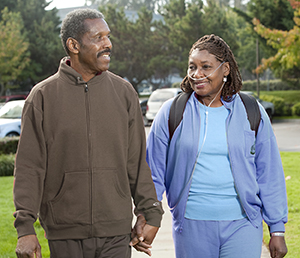Chronic Lung Disease: Your Emotional Well-Being
Chronic lung disease may include COPD (chronic obstructive pulmonary disease), which is chronic bronchitis and emphysema. It may also include pulmonary fibrosis, sarcoidosis, pulmonary hypertension, cystic fibrosis, and other long-term respiratory conditions. When you have chronic lung disease, it’s normal to have good days and bad days. Take care of yourself emotionally and physically. You can take steps to feel more in control of your health and your situation. Remember that your healthcare team, family, and friends are there to help. Don’t be afraid to share your feelings and ask for support.

Staying in control
Chronic lung disease can affect your independence. This can lead to feelings of anger, frustration, anxiety, and depression. The following may help you feel more in control of your life:
-
Keep doing what you enjoy. When you’re planning your day, include some activities that are just for fun like reading, painting, or listening to music.
-
Stay involved with friends and family. This may mean inviting people over to your house more often. Talk about your feelings with people close to you.
-
Learn as much as you can about your lung disease. The more you know, the more control you’ll have. Share what you learn with people close to you. Bring loved ones with you to health appointments. And let them know how they can help with treatment.
-
Follow your treatment plan. Timely and appropriate treatment helps control disease progression and prevent complications. Still, accept that even if you do everything you’re supposed to, you’ll still have ups and downs.
-
Take an active role in your treatment. Talk to your healthcare provider if you have any concerns or questions. New treatments are always being developed. If current treatment isn’t meeting your needs, other options may be available.
-
Save your energy. The way you use your body during a task can help you have more energy. Prioritize your tasks. Do the most important things when you have the most energy. Do activities slowly. Rushing through activities uses more energy. It can also increase shortness of breath. Sit to dress and to do other daily tasks, such as brushing your teeth. Use a cart with wheels to move food, laundry, and other things around your house. Keep the things you use often at waist level. That way you can get them easily.
-
Don’t be afraid to be active. Being active may make you short of breath. Even so, it's good for your lungs. Exercise can strengthen the muscles that help you breathe. Ask your provider about safe exercises for you.
-
Join pulmonary rehab (rehabilitation). Community-based and home-based programs work as well as hospital-based programs. They just need to be as often and as intense. Standard home-based programs help shortness of breath in people with COPD. Supervised, traditional pulmonary rehab is still the best choice for people with COPD. These programs help manage your disease, breathing methods, exercise, support, and counseling. To find one, ask your healthcare provider or call your local hospital. Also talk with your provider about which rehab or self-management program is best for you.
Staying intimate with your partner
Even if you use oxygen, having chronic lung disease doesn’t mean you have to stop having sex. Keep these things in mind:
-
You and your partner may both feel better if you talk about your feelings and concerns. Don’t be afraid to talk with your healthcare provider, too.
-
Sex may feel better if you wait until you’re rested. Use positions that need less energy. This includes lying on your side or your back.
-
Get ready for sex as you would for exercise. Use your inhaler before sex if one has been prescribed. Clear your lungs of mucus if needed. If you use oxygen, set the flow rate for activity.
-
It’s OK if you don’t feel like having sex. You can show your love in other ways. Try hugging, giving a back rub, or just telling your partner how much you care.
Depression and chronic lung disease
Chronic health conditions may affect your mental health. Nonetheless, having chronic lung disease doesn’t mean you have to feel bad all the time. Talk with your healthcare provider or a therapist if you feel worthless or helpless, or are thinking about suicide. These are warning signs of depression. People with COPD are more likely to die by suicide than people without COPD. If you are in distress or have thoughts or plans to harm yourself or others, call or text 988. You will be connected to trained crisis counselors at the National Suicide Prevention Lifeline. An online chat option is also available at www.suicidepreventionlifeline.org. This service is free and available 24/7. Treatment can help you feel better. When depression is under control, your overall health may also improve.